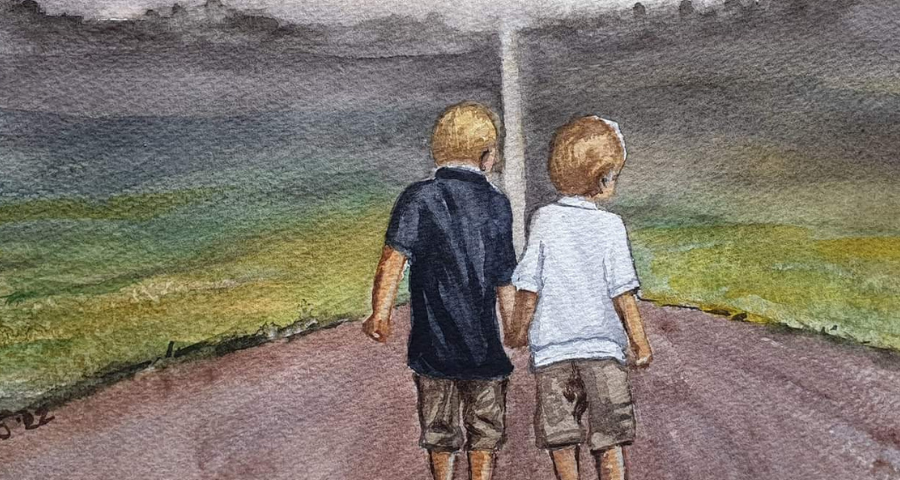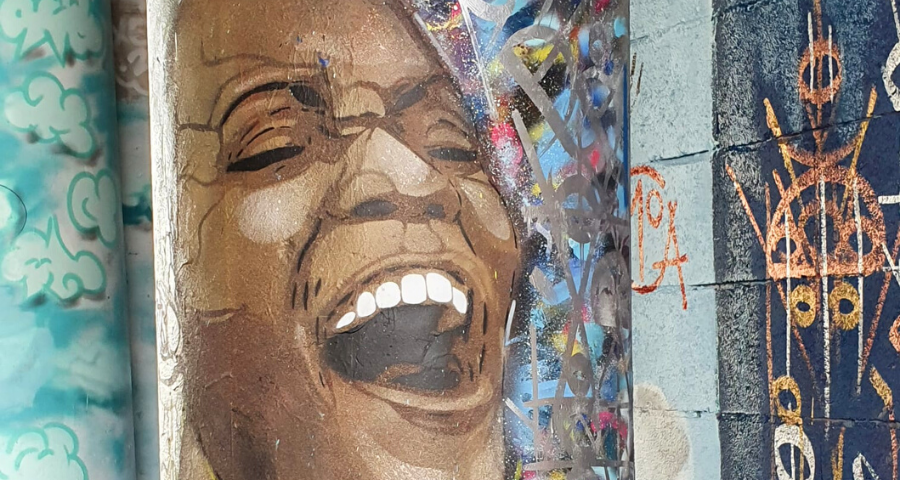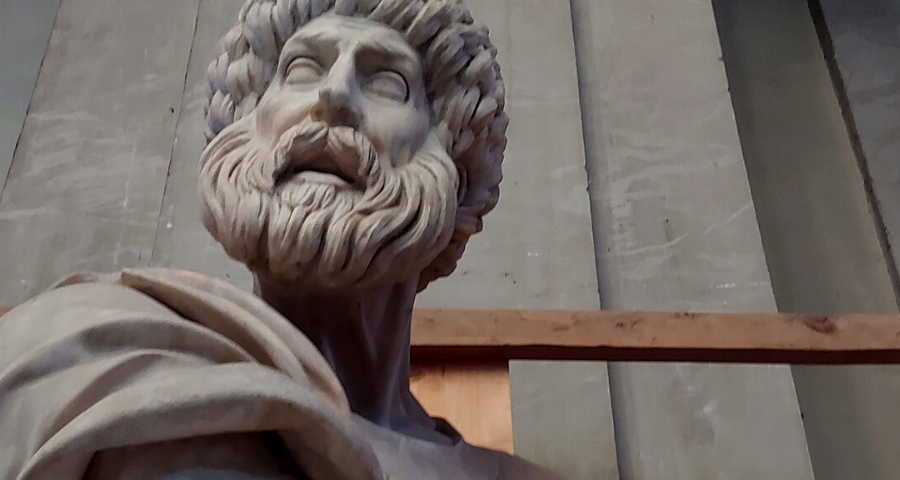The sign and the flesh/14 - When the Bible speaks of conflicts between brothers it always calls for custody
By Luigino Bruni
Published in Avvenire 06/03/2022
Wise men have an idea of the things that are considered good or bad, that is very different from that of ordinary people
Lucio A. Seneca, De constantia sapientis
Hosea's critique of trade reveals new dimensions of both trade and religion centred on sacrifice. And the right way of conducting both.
Biblical prophets are very different from us. Not so much for the chronological distance in terms of time line, but for the lack of categories to be able to understand them. And if we read them using the ideas stemming from religion, secularism, politics and economics they become completely incomprehensible. Religion, for example, understood as a set of cults, norms, sacrifices, liturgies that a group of people build to communicate with their divinity and celebrate it, is not an environment of the prophets. Instead, they look at it with a very critical eye, considering it an obstacle to the only thing that really matters to them: that the people listen to the voice of God and convert from their own religion. They are not religious men, they are men or women of the spirit, and they know by vocation that the most normal means that religious men and women use to not obey God's voice is precisely, religion, which too often becomes the place to hide from YHWH for not having to answer his terrible question: "Men, where are you?"
This is why the first criticism of the prophets is addressed precisely at religious practices, sacrifices, worship, in the past as well as today: «Do they sacrifice bulls in Gilgal? Their altars will be like piles of stones on a plowed field» (Hosea 12,11). The altar of Gilgal was not an idolatrous altar. Calves were offered to the God of Israel on those stones - it had been erected by Joshua (Joshua 5,9). Hence, the prophets do not stigmatize these sacrifices for being offered to the wrong gods, to idols (sometimes, also to idols) but because even when people use them to worship the true God they make him become an idol like everyone else. Hosea’s great words – «For I desire mercy (Hesed), not sacrifice» (Hosea 6,6) – are the soul of the whole book, of all the books of the prophets, they are the essential soul of the entire Bible, Old and New Testament, which also completes and corrects the biblical pages on sacrifices. The Bible, from Genesis to Revelation, tried above all to tell us about another God who would overcome the materiality of the victims and the blood that were at the centre of ancient and natural religions, without completely succeeding. Not even the New Testament has always been able to develop that anti-sacrificial prophetic soul. In some of its texts it interprets the death of Christ as a "sacrifice", certainly different from the ancient ones, but always within the sacrificial logic of victim and blood, while the Gospels told us of a Jesus who did everything to avoid the cross, right up to the end. Revealing a love-agape-hesed Father-God who is totally outside the sacrificial register to us. The biggest problem, however, is that we like sacrifices, they satisfy our religious needs, they give us the illusion of controlling something of what is divine, of being able to direct his graces towards our wishes. Hence, we end up creating an idea of God who loves sacrifices, building a theology in the image and likeness of our own religious needs.
In the great chapter twelve in the Book of Hosea, we find yet another very strong discourse on wealth: «The merchant uses dishonest scales and loves to defraud. Ephraim boasts, “I am very rich; I have become wealthy. With all my wealth they will not find in me any iniquity or sin"». (Hosea 12,7-8). Hosea's radical criticism (which starts from the root) of the Israelites continues, the constant and tenacious accusation of atavistic corruption of his people, which dates back to the early days of the Covenant, when the Jews arrived in Canaan after the Exodus and the years spent in the desert, and immediately learned and assimilated the vices of the indigenous people. In general, we think that the Canaanite peoples were primitive and convoluted from an economic and social point of view, partly because the Bible shows us these peoples from the perspective of a military and religious enemy (worshipers of stupid idols). In fact, from archaeological finds today, we know that the Canaanite region (which would become Palestine by way of the Romans) had a flourishing agricultural civilization and an advanced cultural and religious life, already back in the Ancient Bronze Age (2300-2400 BC). The Canaanites had developed an intense commercial activity with Egypt and Lebanon, so much so that in some biblical books the word "Canaanite" is synonymous with merchant. Israel therefore did not discover the commercial world in exile in Babylon, it had assimilated it centuries earlier when it arrived in the Promised Land - it cannot be ruled out that some of the Jewish tribes were Canaanites, who later merged with the people of Israel.
Hosea's view on trade is therefore very harsh and he utters words in line with those of Amos and later those of Isaiah and Jeremiah. Here, however, the criticism of wealth is not linked to the idolatrous controversy (the golden calf). No, instead it is a "civil", ethical criticism aimed at the intrinsic nature of economic and mercantile activity. Added to the prophetic criticism, the same important and insistent question comes back once more: why? Why do the prophets, including Jesus, dislike businesses and traders so much? Certainly, there is the empirical data of commercial activity as a favourable place for cheating and deception due to the 'information asymmetries' between traders and ordinary people. There is also the idea rooted in pre-modern cultures that commercial exchange was a "zero-sum game", where the merchants 'gains are equal and opposed to the customers' losses. A belief that is not always incorrect, especially when the world finds itself in a static situation, where wealth resembles a given sized pie where a bigger slice for me means a smaller slice for you. Then there is also the ethical fact that a rich man will find a fake kind of security in his wealth that is in direct competition with the true kind found in God, a further confirmation that the prophets do not see the blessing of God in wealth. However, there must also be something else of a theological character.
The prophets saw the reflection of commercial and sacrificial religion of the cult of idols, from which they wanted to save their people, in human commerce. The spread of commercial logic among the people brought with it the growth of economic religion centred on sacrifices, and vice versa - it is difficult to say whether the homo economicus of business or the homo religiosus of sacrifices came first, because, in fact, they are almost the same thing. Hence, Hosea equates the religious deception of the Israelites against YHWH (Hosea 12,1) to that of traders against their customers through rigged scales. Hence, commercial logic becomes an obstacle to understanding God's gratuitous love and therefore the most important things in life. And when trade grows too much in a society, religion immediately becomes commercial too, and gratuitousness is forgotten everywhere. This ethical and theological controversy against commerce and merchants continued throughout the Middle Ages and well into modernity, especially in the Catholic world where, much more so than in the Protestant one, being a bursar remained above all the profession of Judas. With a very important consequence: the merchants who do not fake the scales (of which there are, and there are many) continued to be surrounded by a deep and heavy ethical mistrust and civil disrespect. Thus, another question: when will today's prophets, who rightly continue to condemn cheating merchants and businessmen (and those who use trade as a tool of war), also begin to praise those different kind of merchants, who practice and live their craft with the same hesed-agape of God?
In the conclusion of his chapter, Hosea continues to amaze us with daring and beautiful theological and historical theses: «Jacob fled to the country of Aram; Israel served to get a wife, and to pay for her he tended sheep. The Lord used a prophet to bring Israel up from Egypt, by a prophet he cared for him» (Hosea 12,12-13). Jacob, we also know from Genesis, became a guardian of the flock of Laban in order to have a wife, Rachel, as his "reward" or "wages". Moses instead practiced another form of custody; he shepherded the people from Egypt across the desert. Jacob became a sentinel or keeper for private custody, to find a wife - note that the first time we find the word "wages" in the Bible is in regards to Rachel, who was the wages Jacob got for his work as a keeper (Genesis 29,15). Moses was the guardian of the people, and therefore a prophet. It is indeed of great importance and beauty that the word that Hosea uses to say guardian-keeper is shomer, the great biblical word with which the prophets define themselves as "sentinels" or "watchmen" (think of the wonderful song of Isaiah 21,11 «Watchman, what is left of the night?»)
The tension between a tradition which saw the origin of Israel in the descent of Abraham and the patriarchs from Ur of the Chaldeans, and the other which began in Egypt, in the desert and in the ascent to Canaan, also returns in Hosea. Furthermore, we must not forget that whenever we find a reference to a conflict between two brothers in the Bible, somewhere between the lines there is an implicit quote: that of the first two brothers. Hosea continues to present Jacob-Israel to us along the lines of Cain not on those of Abel. Cain was not Abel's shomer (Genesis 4,9) and therefore became fratricidal, reminding us that custody is the other name of fraternity. Hosea is the first in the Bible to call Moses a "prophet". It is important that Hosea consider Moses the forefather of the biblical prophets. To tell us that prophecy does not end where the Law, government and institution begin (the typical prerogatives of Moses in the Bible), because prophecy also has its own institutional, juridical and governmental dimension, although very different from that of kings and priests.
Communities begin their, often irreversible, decline, when they begin to think, under the pressure of false prophets, that the prophets must deal only with "spiritual" things and not interfere with their utopian ideals in political and governmental choices. They proceed to carve out small harmless religious areas for them, where they are subsequently praised and even exalted, as long as they do not leave the enclosure of the sanctuary. The invisible but sturdy stakes of this fence are called idealism, naivety, utopia and lack of practical sense, which are evoked every time a prophets who tries to cross the threshold of the magic circle needs to be silenced. Prophecy is hence made to coincide with the utopia, forgetting that prophecy, unlike utopia, is always concrete, insisting on a base of very real concrete ground. Prophecy is an already-here-and-now that indicates a not-yet that makes its already-here and-now true and highly concrete. A government that confines the prophets to a religious realm of the harmless is short-sighted, cynical, and never on the side of the poor and weak, incapable of vision and subservient to the interests of wrongful merchants. These communities could only be saved by the prophets, if any of them would be able to break the chains and get out of the cave.













